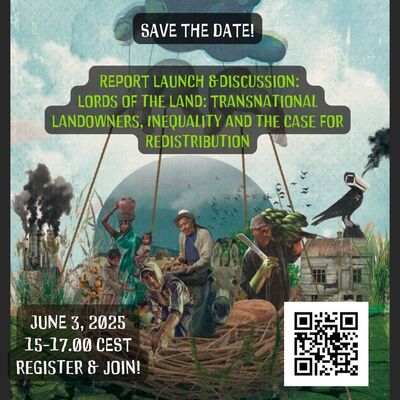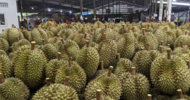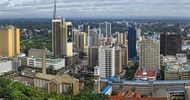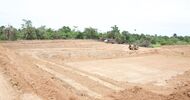Analytical evaluation of effect of current land grabbing policy indicates destabilization of livelihood assets of rural communities of Oromia and Southern Ethiopia.
- Finfinne Tribune
-
26 January 2016
"Africa will be more food insecure if these investments go to other parts of the world and Africa has to turn to those places to buy food," according to Dr Ousmane Badiane of IFPRI
- This is Africa
-
02 July 2012
Investment managers meeting at the Waldorf Astoria in New York said rising US farmland prices were making it harder to find quality land and high returns, and a lot of capital flow is moving to developing nations.
Cargill and Bunge among firms setting up funds to buy farms in Asia and South America.
Saudi Arabia is attempting to strengthen its position in what seems certain to be a growing competition for food among the nations of the Middle East.
- Council on Foreign Relations
-
27 April 2010
A tycoon once named one of Indonesia’s richest has gone on trial for alleged corruption estimated to have cost the state the equivalent of US$5.25 billion and caused major environmental damage from the destruction of vast amounts of virgin forest for oil palm plantations.
- Asia Sentinel
-
09 September 2022
A totalitarian approach to conservation that led to increased inequity, undermining of democracy, and violent evictions
- REDD Monitor
-
06 April 2019
AGCO CEO says his company is planning to have a second “future farm” in Nigeria because it’s also a very big market. AGCO's first "future farm' is in Zambia.
- African Agribusiness
-
15 September 2014
A consortium of Saudi groups - comprising dairy giant Almarai, grain importer Al Rajhi and Salic, the agriculture arm of the country's Public Investment Fund sovereign wealth fund – buys Continental Farmers Group, which has large farming operations in Poland and the Ukraine.
Since Jane Mendillo took over the endowment in July 2008, Harvard’s holdings of forests, farms and other natural resources in Brazil as well as in New Zealand and Romania have grown to about 10 percent of the portfolio -- more than $3 billion -- and she wants to add more.
- Bloomberg
-
18 September 2012
Pambazuka News spoke to Anuradha Mittal, Jeff Furman and Frederic Mousseau about what prompted their research on large-scale investments in land in Africa and what they discovered.
China's enormous sovereign wealth fund, the China Investment Corporation, may have set aside up to 1.5% or about $6 billion of its massive foreign exchange reserves to invest in New Zealand assets, including potentially dairy farms.
The creation this week of the 'Save our Farms' campaign to block foreign ownership of New Zealand farm land has fired up a debate that needs to be had.
There’s a whole school of economic thought that says that Collier is wrong, that big is not necessarily better in agriculture — and that the land deals therefore might be unwise not because they’re wrong but because they’re unprofitable.
- New York Times
-
19 November 2009
Private equity used to stay away from anything to do with agriculture, put off by the uncontrollable risks of bad climate and natural disasters. And yet in the last three years some big funds have been launched in the agribusiness space, and they are busy trying different ways of mitigating the risks.
Huge investment funds have already poured hundreds of billions of dollars into booming financial markets for commodities like wheat, corn and soybeans. But a few big private investors are starting to make bolder and longer-term bets that the world’s need for food will greatly increase — by buying farmland, fertilizer, grain elevators and shipping equipment.
- New York Times
-
05 June 2008
The bigger question—one Tasmania must answer soon—is how much of its food-bowl can be outsourced to balance sheets before community cohesion snaps.
Under the guise of ‘conflict mediation’ and community empowerment, the work of certain corporate NGOs results in communities continuing without access to and control over their lands, and in strengthening destructive production models.
On April 3, 89 civil society organizations signed a joint statement calling on the IFC and the EBRD to ensure remedy and accountability, for the severe and systemic violations at Indorama Agro cotton project, Uzbekistan. In 2019, a presidential decree allocating 50,000 hectares of land to Indorama Agro resulted in the arbitrary termination of thousands of farmers’ land leases without free, prior and informed consent.
- Coalition for Human Rights in Development
-
03 April 2025
Canada's Blended Finance Project interviews Witness Radio and GRAIN about the role public development banks play in facilitating land grabs around the world.
The most effective means of countering corporate power is to restore control of the land and agricultural knowledge to the communities who live on and with the land.
- Agrarian Trust
-
13 July 2022
CRR’s sustainability analysis shows that deforestation and fires have taken place on TIAA’s farmland portfolio in Brazil, enabling negative social impacts on local communities.
Hungarian legislator Erik Bánki claims his farmland purchases in Romania were financed from loans from foreign and Hungarian companies but he does not remember the names of these companies.
Une société new-yorkaise chargée de la gestion de l'épargne-retraite des travailleurs en Suède, aux États-Unis et au Canada se soustrait aux lois brésiliennes sur les investissements étrangers pour acquérir des terres agricoles
In Brazil, El Tejar and others are investing in ownership and hope to capture land appreciation. BrasilAgro brags that it sold one farm for a gain of 116 percent in just 17 months.
Today's emerging new farm owners are private equity fund managers, specialised farmland fund operators, hedge funds, pension funds, big banks and the like.
Because of the political sensitivity of the modern-day land grab, it is often only the country's head of state who knows the details. Der Spiegel investigates.
High on Chongqing's shopping list is more than 333,000 hectares of farmland, which Huang said would reduce the city's dependence, for example, on imported edible oil.
Interview with Mayur and Kamlesh Madhvani, the Joint Managing Directors of the Madhvani Group which controls a 14,000 hectare sugar estate in Uganda
Between 2000-2011, 68% of all investigated foreign capital to 9 top companies in soy and beef sectors in the Brazilian Amazon was transferred through tax havens. Soy and beef production cause major Amazon deforestation.
- Mongabay
-
21 November 2018
















